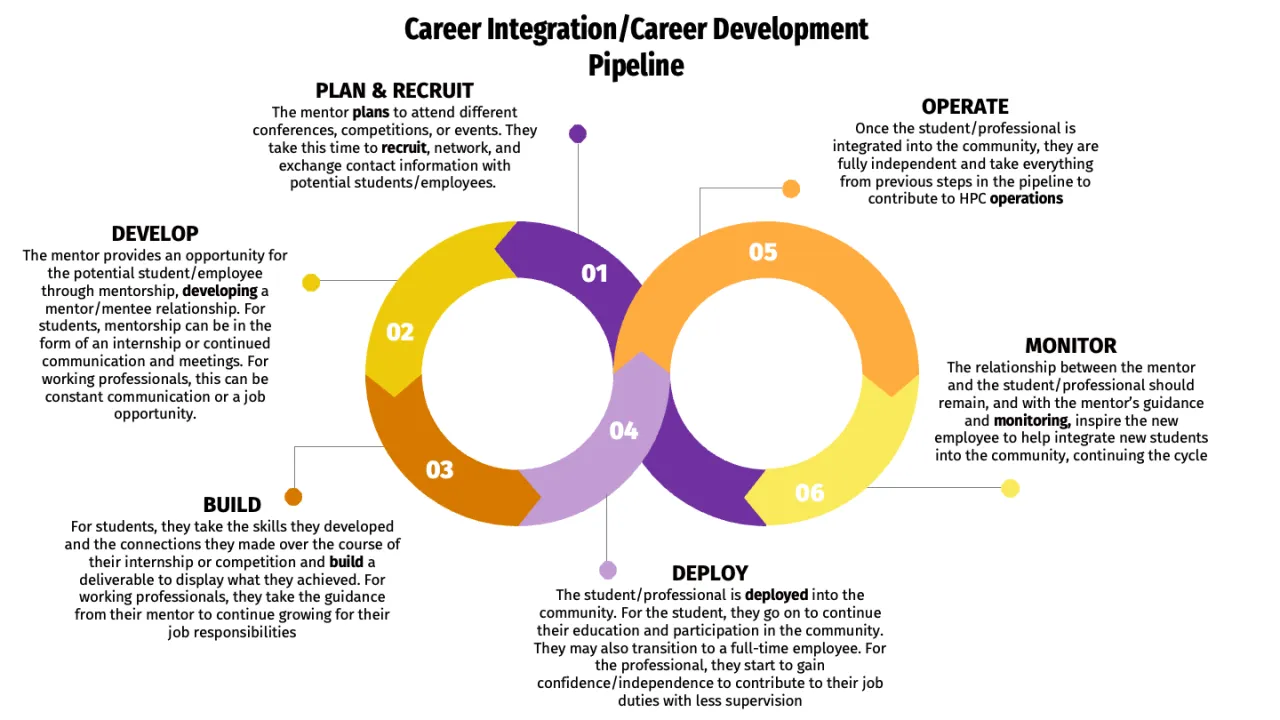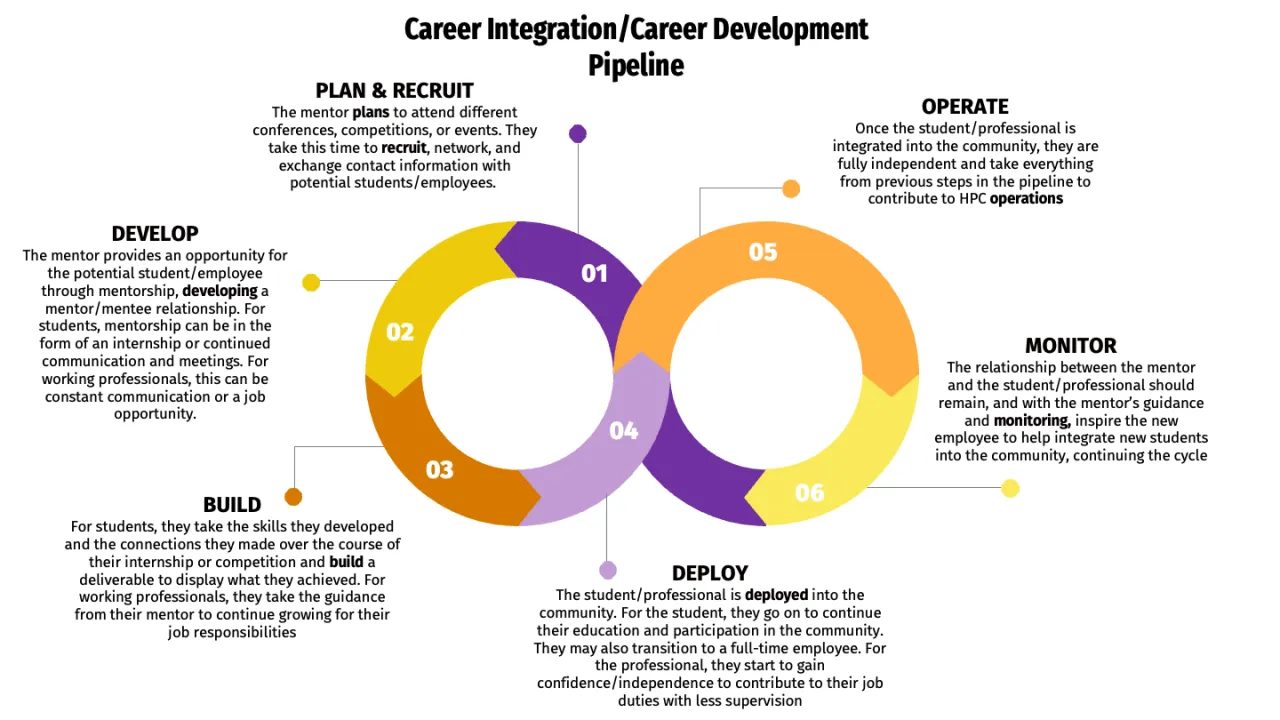

Following the CI/CD (Career Integration and Career Development) Pipeline to Introduce, Develop, and Retain Professionals in the HPC Community
Monday, May 13, 2024 3:00 PM to Wednesday, May 15, 2024 4:00 PM · 2 days 1 hr. (Europe/Berlin)
Foyer D-G - 2nd floor
Women in HPC
Community EngagementPromotion of Young Talents
Information
Poster is on display and will be presented at the poster pitch session.
The demand for high-performance computing (HPC) and artificial intelligence (AI) expertise is soaring in today's rapidly evolving tech industry. The HPC community is a critical field, as its work contributes to the greater scientific community and makes the world a better place. This surge in demand has created a significant challenge for organizations: the need for more skilled professionals to fill critical roles. This challenge presents an opportunity for students and early career professionals to develop their skills and differentiate themselves in this versatile field. How should we as a community not only bring in new talent, but develop and maintain it? One strategy is to follow the CI/CD (Career Integration and Career Development) Pipeline. Which describes how to integrate students into the HPC community and develop a robust network that continues to recruit young and diverse talent. The CI/CD Pipeline is outlined in 6 essential stages: Plan & Recruit, Develop, Build, Deploy, Operate, Monitor - all tethered together through development. The first step of this process is Plan & Recruit, which is essential in the HPC community as it may not be as obvious as organizations in other computing spaces, and requires a bit more effort in marketing opportunities to students and external career professionals. Recruiting is also powerful tool in cultivating a diverse and talented work force, which is especially crucial to the HPC Community as it fosters unity within the open science world. The second step of the pipeline is Develop (through internships). By offering opportunities for internships to students within our community, we can create interest in the HPC field by showcasing all the possible careers within it. It also can lay the foundation for developing skills and making connections that can only be achieved by experience outside of a classroom setting. The next stages of the pipeline are Build, Deploy, and Operate. Development from interns into professionals can be accomplished by providing them guidance over the course of their internship and allows them to build a project that they can use to further their career and deploy them into the workforce. Once deployed, they can now take all of their skills to facilitate in the operations of the HPC community. Once interns have evolved into career professionals and chosen an HPC related career path, it is equally as important to retain the newly acquired talent. By assuring a diverse and welcoming work environment, we can further deepen the expertise held by professionals in our field. The last step in the pipeline is Monitor. Continued mentorship is crucial in completing and continuing the CI/CD cycle and should not stop once the student becomes an employee. Once a professional has developed enough in their career, they feel comfortable in becoming a mentor for the new interns that enter the cycle. Mentors are responsible for ensuring that their mentees have an overall positive internship experience and put the steppingstones in place for future career professionals in HPC.
Contributors:
The demand for high-performance computing (HPC) and artificial intelligence (AI) expertise is soaring in today's rapidly evolving tech industry. The HPC community is a critical field, as its work contributes to the greater scientific community and makes the world a better place. This surge in demand has created a significant challenge for organizations: the need for more skilled professionals to fill critical roles. This challenge presents an opportunity for students and early career professionals to develop their skills and differentiate themselves in this versatile field. How should we as a community not only bring in new talent, but develop and maintain it? One strategy is to follow the CI/CD (Career Integration and Career Development) Pipeline. Which describes how to integrate students into the HPC community and develop a robust network that continues to recruit young and diverse talent. The CI/CD Pipeline is outlined in 6 essential stages: Plan & Recruit, Develop, Build, Deploy, Operate, Monitor - all tethered together through development. The first step of this process is Plan & Recruit, which is essential in the HPC community as it may not be as obvious as organizations in other computing spaces, and requires a bit more effort in marketing opportunities to students and external career professionals. Recruiting is also powerful tool in cultivating a diverse and talented work force, which is especially crucial to the HPC Community as it fosters unity within the open science world. The second step of the pipeline is Develop (through internships). By offering opportunities for internships to students within our community, we can create interest in the HPC field by showcasing all the possible careers within it. It also can lay the foundation for developing skills and making connections that can only be achieved by experience outside of a classroom setting. The next stages of the pipeline are Build, Deploy, and Operate. Development from interns into professionals can be accomplished by providing them guidance over the course of their internship and allows them to build a project that they can use to further their career and deploy them into the workforce. Once deployed, they can now take all of their skills to facilitate in the operations of the HPC community. Once interns have evolved into career professionals and chosen an HPC related career path, it is equally as important to retain the newly acquired talent. By assuring a diverse and welcoming work environment, we can further deepen the expertise held by professionals in our field. The last step in the pipeline is Monitor. Continued mentorship is crucial in completing and continuing the CI/CD cycle and should not stop once the student becomes an employee. Once a professional has developed enough in their career, they feel comfortable in becoming a mentor for the new interns that enter the cycle. Mentors are responsible for ensuring that their mentees have an overall positive internship experience and put the steppingstones in place for future career professionals in HPC.
Contributors:
Format
On-site

